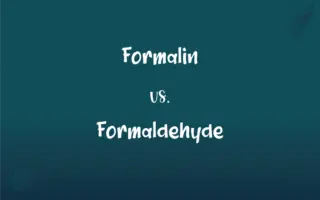Iodine vs. Iodide: What's the Difference?
Edited by Aimie Carlson || By Janet White || Published on January 18, 2024
Iodine is a chemical element (symbol I) with a dark, lustrous appearance and strong disinfectant properties. Iodide is a negative ion of iodine (I-) typically formed when iodine bonds with another element.

Key Differences
Iodine is a non-metallic element, found naturally in some foods and used in various medical and industrial applications. Iodide, on the other hand, is the ionized form of iodine, usually occurring when iodine gains an electron during a chemical reaction.
In its elemental form, iodine is known for its dark purple crystals and a distinctive odor, used as a disinfectant and in thyroid hormone production. Iodide, being the ion form, is usually combined with other elements, like potassium, to form compounds like potassium iodide.
Iodine can be used in water purification and as a dietary supplement to prevent iodine deficiency. Iodide, in its compound form, is often used in medical treatments, such as in thyroid therapies and as a protective agent against radiation.
Iodine's antibacterial properties make it effective for wound cleaning and water treatment. Iodide ions, being more stable, are commonly used in salt and food additives to ensure iodine intake.
Iodine in its elemental form is less stable and can be hazardous in high concentrations. Iodide, being more stable and less reactive, is often preferred in dietary and medical applications.
ADVERTISEMENT
Comparison Chart
Chemical Form
Elemental form (I)
Ionized form (I-)
Appearance and Properties
Dark purple crystals, volatile, strong odor
Typically found in compound forms, more stable
Uses in Medicine
Disinfectant, thyroid hormone production
Thyroid treatments, radiation protection
Stability and Reactivity
Less stable, more reactive
More stable, less reactive
Common Forms and Applications
Pure iodine, water purification
Potassium iodide, dietary supplements
ADVERTISEMENT
Iodine and Iodide Definitions
Iodine
It's a vital component of thyroid hormones.
Dietary iodine is essential for thyroid health.
Iodide
Iodide can protect against radiation exposure.
Potassium iodide tablets are distributed in nuclear emergencies.
Iodine
It's found naturally in certain foods and seawater.
Seaweed is a rich natural source of iodine.
Iodide
Iodide is the ionized form of iodine, often found in compounds.
Potassium iodide is used as a dietary supplement.
Iodine
Iodine can be used for water purification.
Iodine tablets are used to disinfect water in emergency situations.
Iodide
It's used in medical treatments, like thyroid therapy.
Iodide is given to patients with thyroid gland dysfunction.
Iodine
Iodine is a dark purple non-metallic element used in disinfection.
Iodine is applied to wounds for its antiseptic properties.
Iodide
It's commonly added to table salt to prevent iodine deficiency.
Iodized salt is a primary source of iodide in many diets.
Iodine
Iodine is less stable in its elemental form.
Elemental iodine is handled carefully in laboratories due to its reactivity.
Iodide
Iodide ions are more stable than elemental iodine.
Iodide is preferred in food additives for its stability.
Iodine
Symbol I A lustrous, purple-black, corrosive, poisonous halogen occurring as a diatomic molecule, I2, that easily sublimes to give a purple gas and is a trace element essential for proper thyroid function. Radioactive isotopes, especially I-131, are used as medical tracers and in thyroid disease diagnosis and therapy. Iodine compounds are used as germicides, antiseptics, and dyes. Atomic number 53; atomic weight 126.9045; melting point 113.7°C; boiling point 184.4°C; density of gas 11.27 grams per liter; specific gravity (solid, at 20°C) 4.93; valence 1, 3, 5, 7. See Periodic Table.
Iodide
Univalent anionic iodine, or a compound of iodine, especially a binary compound of iodine with a more electropositive element.
Iodide
(inorganic chemistry) A binary compound of iodine and another element or radical.
Iodide
A binary compound of iodine, or one which may be regarded as binary, in which iodine has a valence of -1; as, potassium iodide.
Iodide
A salt or ester of hydriodic acid
FAQs
What is iodine?
A non-metallic element, important for thyroid function and used as a disinfectant.
How is iodine used in medicine?
As a disinfectant and for thyroid hormone production.
Is iodide present in table salt?
Yes, as potassium iodide to prevent iodine deficiency.
Is iodine naturally occurring?
Yes, in seawater, certain soils, and foods.
What is iodide?
The ionized form of iodine, often found in compounds like potassium iodide.
What are the medical uses of iodide?
In thyroid therapy and as a protective agent against radiation.
Can iodine be found in food?
Yes, especially in seafood and iodized salt.
Can iodine be harmful?
In high concentrations, it can be toxic.
Can iodine deficiency affect health?
Yes, leading to thyroid disorders and cognitive impairments.
What form does iodide typically take?
It's usually part of compounds, like potassium iodide.
Why is iodide added to salt?
To ensure sufficient dietary intake of iodine.
How is iodide beneficial for thyroid health?
It's a key component of thyroid hormones.
Is iodine used in emergency kits?
Yes, for water purification and as a protective agent against radiation.
What is the role of iodide in radiation protection?
It helps protect the thyroid from radioactive iodine.
How is iodine used in water treatment?
To purify water through its antibacterial properties.
Are iodine and iodide safe for everyone?
Generally, but excessive intake or allergies may cause issues.
How are iodine and iodide different in chemical reactivity?
Iodine is more reactive, while iodide is less reactive and more stable.
What is the difference in stability between iodine and iodide?
Iodide is more stable than elemental iodine.
Why is iodine important for health?
It's crucial for the production of thyroid hormones.
Are there dietary supplements for iodine?
Yes, often in the form of iodide.
About Author
Written by
Janet WhiteJanet White has been an esteemed writer and blogger for Difference Wiki. Holding a Master's degree in Science and Medical Journalism from the prestigious Boston University, she has consistently demonstrated her expertise and passion for her field. When she's not immersed in her work, Janet relishes her time exercising, delving into a good book, and cherishing moments with friends and family.
Edited by
Aimie CarlsonAimie Carlson, holding a master's degree in English literature, is a fervent English language enthusiast. She lends her writing talents to Difference Wiki, a prominent website that specializes in comparisons, offering readers insightful analyses that both captivate and inform.






































































